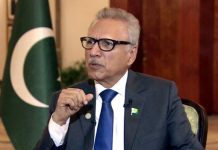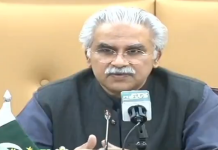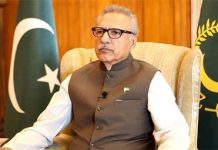SHARDA: A mother of five is set to give birth again. It is a dangerous prospect for women in the remote mountains of Azad Kashmir, where doctors are few and medical assistance is not available.
“We are afraid we could die,” said Asmat Nisa, a mother of five set to give birth again
“There is no hospital here and I have never seen a female doctor,” said Nisa, who is from the village of Arang Kel in Kashmir’s Neelum Valley.
She said her doctor should be a woman as local customs dictate that male doctors are not permitted to examine women during pregnancy or labour.
This restriction combined with the isolation and severe weather of the plunging, remote valleys makes giving birth one of the deadliest moments in the lives of its women and newborns, she added.
Maternal, newborn and child health for Azad Kashmir Director Farhat Shaheen said, “The major reason for the deaths of mothers and newborn babies in the remote areas of Neelum Valley is unskilled and untrained midwives assisting the pregnant women during delivery.” She said 54 babies out of every 1,000 are stillbirths or first day deaths in Kashmir.
A report in 2014 by the charity Save the Children stated that Pakistan had the highest rate of first day deaths and stillbirths in the world at 40.7 per 1,000 births. According to the same report, “In Europe 5.9 babies for every 1,000 do not survive the first 28 days. Even neighbouring Afghanistan, torn apart by decades of war, does better than Pakistan, with a rate of 29 first day deaths and stillbirths for every 1,000 births.”
Shaheen said the numbers of the deaths are very high and in the village of Sharda, some 20 kilometres from Arang Kel, inhabitants scattered across two mountains face life and death with a single Basic Health Unit (BHU).
She said the facility has one male doctor which is useless for pregnancy and childbirth by his gender, and three lady health visitors, as they are known local women whose job is to create awareness about health and hygiene, but who do not give treatment and are not medically trained which leaves alone midwife to help the women of Sharda and the surrounding areas, a population of around 17,000 through childbirth.
The isolation of the region, which is covered with four to five feet of snow in winter, is a significant factor in medical staff’s reluctance to work there, said Dr Sardar Mahmood Ahmed Khan, director general of the health service in Azad Kashmir.
There is no electricity and small turbines used to generate hydropower from the streams and rivers sparkling through the valleys, enough to fuel lights, but not much more required in the BHUs.
Pregnant women fight to scrape a living on the plunging slopes of the unforgiving mountains, carrying wood, cutting grass, working in the fields, said Riffat Bibi, a lady health visitor at Sharda BHU. She said poor nutrition is also a factor ruining maternal health.
“We have to do our hard daily household routine work during our pregnancies”, said Rubina Bashir, a mother-to-be in Sharda. Some 758 health units ranging from first aid centres to hospitals serve the area, with around 3,000 lady health visitors.
A local resident Habib Ullah said that last year his wife’s delivery ran into complications. His newborn child did not survive the eight-hour journey to a hospital in the main city of Muzaffarabad, with its better facilities and larger proportion of women doctors.
He said, “My wife was near to death, but she luckily survived and he had to borrow Rs 200,000 rupees to pay the medical bills roughly 20 times what he earns in a month.
Another Sharda resident, Jahangir Lone, described how his sister-in-law died during the birth of her eighth child.
Khan said a special Reproductive, Maternal, Newborn, and Child Health (RMNCH) Programme launched in 2007 has been offering special incentives to persuade doctors to the area.
He said doctors who do go, be they men or women, get higher wages than those who work in cities adding that the government has fixed the average wage at Rs 80,000 per month in the rural areas of Azad Kashmir, compared to 65,000 rupees in the towns.
He said the wage for specialists in far-flung areas is Rs 150,000 compared to Rs 100,000.
Pakistan’s government had provided Rs 500 million to run the RMNCH Programme being run by Shaheen that sought to train medical staff.
Tufail Ahmed, a postman in Kel Sehri village in the outskirts of Shardah town, said that his wife had suffered complications during her pregnancy but he could not afford to move her adding that their child was stillborn
He said, “I appealed to the government to provide us female doctors in our region so that no one else has to lose his child.”









